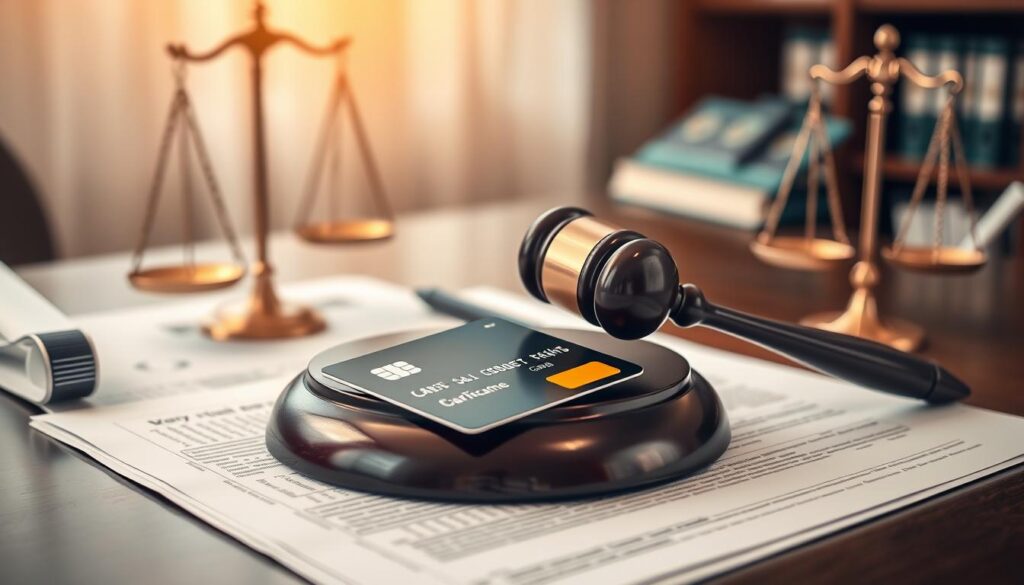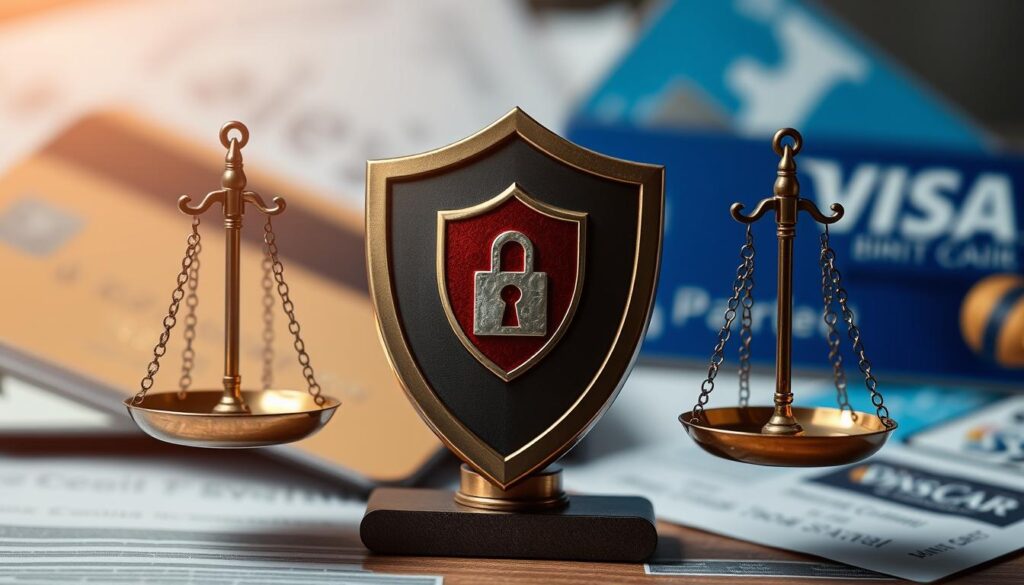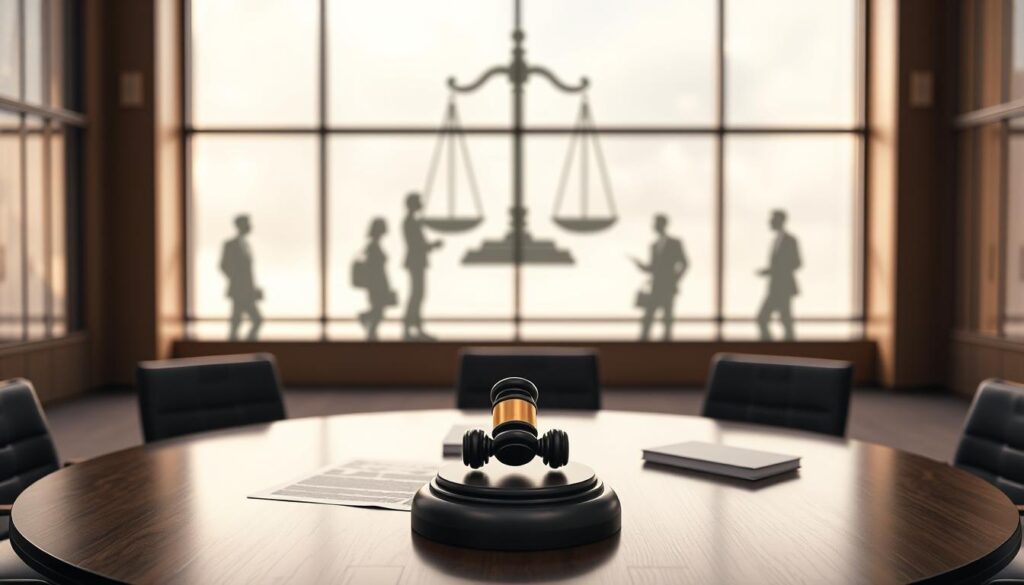Credit card issues can be overwhelming. Unfair charges, billing errors, or fraud require expert help. Credit card dispute attorneys offer vital support in these complex situations.
These legal pros know your rights under the Fair Credit Billing Act. They can spot billing errors and fraud. Plus, they’ll work with credit card companies to solve your problem.
Key Takeaways
- Credit card dispute attorneys protect your rights and help resolve issues.
- They expertly handle complex disputes and work with credit card companies.
- Legal help is crucial for unfair charges, billing errors, or fraud.
- These attorneys explain your Fair Credit Billing Act rights.
- Professional legal advice boosts your chances of winning disputes.
Credit Card Dispute Attorneys: Helping You Fight Unfair Charges
Credit card dispute attorneys are champions for consumers facing unfair billing practices and fraud. They have the expertise to protect your rights in complex financial situations. These legal experts help you navigate the intricate world of consumer finance.
These attorneys specialize in handling unauthorized charges and billing errors on credit card accounts. They can explain your rights under the Fair Credit Billing Act. They’ll gather evidence and communicate with credit card companies to resolve disputes.
“Credit card dispute attorneys are invaluable in helping consumers reclaim their financial well-being and hold credit card companies accountable for unfair practices.”
If you’ve experienced identity theft or recurring billing issues, these attorneys can help. They’re your allies in the fight for consumer protection. With their expertise, they’ll guide you through the legal process.
Working with these attorneys helps safeguard your financial interests. They can prevent damage to your credit score and personal finances. Their guidance empowers you to assert your rights effectively.
These experts can negotiate with credit card companies on your behalf. They’ll work tirelessly to achieve a favorable resolution to your dispute. With their help, you can secure the justice you deserve.
Understanding the Fair Credit Billing Act
The Fair Credit Billing Act (FCBA) protects consumers from unfair credit card billing practices. It gives people tools to spot, challenge, and fix billing errors. This law helps ensure fair treatment for credit card users.
Your Rights as a Consumer
The FCBA lets you dispute billing errors within 60 days of getting your statement. These errors can include unauthorized charges, wrong amounts, or missed payment posts. Credit card companies must investigate and fix errors quickly.
Common Billing Errors Covered by the Act
- Unauthorized charges: Transactions made without the cardholder’s consent.
- Incorrect amounts: Discrepancies between the billed amount and the actual purchase price.
- Failure to post payments: When a payment made by the cardholder is not properly credited to their account.
- Charges for items not accepted or delivered as agreed.
- Computational or other errors on the monthly statement.
Knowing your FCBA rights helps you handle credit card billing with confidence. You can ensure fair billing practices and stand up for yourself. The FCBA is your ally in dealing with credit card companies.
“The Fair Credit Billing Act is a powerful tool that empowers consumers to hold credit card companies accountable for their billing practices.”

When to Seek Legal Assistance
Sometimes, you might need credit card dispute attorneys to protect your rights and finances. While you can handle some disputes alone, certain situations require legal help.
Legal assistance becomes crucial when credit card companies are unresponsive to your concerns. If negotiations fail, lawyers can enforce your rights under the Fair Credit Billing Act.
When filing a lawsuit against a credit card company, an experienced attorney is invaluable. They can navigate the legal system and uphold your consumer protection rights.
Complex issues like identity theft, unauthorized charges, or billing errors may need legal professionals. Credit card dispute attorneys can use consumer protection laws to safeguard your financial interests.
“Seeking legal assistance can be a game-changer when dealing with unresponsive credit card companies or complex credit-related disputes.”
Consider hiring credit card dispute attorneys based on your situation’s severity and complexity. Legal professionals can help achieve favorable outcomes and protect your consumer protection rights.
Debt Relief Lawyers: Advocating for Your Financial Well-being
Debt relief lawyers are crucial allies for credit card issues. They negotiate with creditors to protect your financial health. Their expertise ensures favorable outcomes for your financial situation.
Negotiating with Creditors
Debt relief lawyers have strong negotiation skills to communicate with creditors. They can reduce interest rates and lower monthly payments. These professionals also work to secure debt forgiveness while protecting your consumer rights.
Exploring Debt Settlement Options
Debt settlement can be a viable solution in some cases. Lawyers can negotiate with creditors to settle debts for less. This approach can provide a path to financial freedom.
Debt relief lawyers help address your credit card disputes proactively. They explore debt settlement opportunities to empower your financial future. These professionals navigate the complexities of creditor negotiation with expertise.
“Debt relief lawyers are the champions of the financially distressed, using their legal expertise to negotiate favorable outcomes and restore financial well-being.”

Credit Card Litigation: A Last Resort
Credit card litigation becomes necessary when other dispute options fail. Credit card dispute attorneys guide consumers through legal processes against credit card companies. This approach protects consumer protection rights and resolves credit card disputes.
Litigation is considered when direct communication or CFPB complaints don’t work. Attorneys help navigate complex legal processes and uphold consumer rights.
Factors justifying credit card litigation include:
- Persistent refusal by the credit card company to address legitimate billing errors or fraudulent charges
- Violations of the Fair Credit Billing Act or other consumer protection laws
- Attempts by the credit card company to collect on disputed charges or take adverse action against the consumer
Legal action can remove disputed charges and recover damages. It may also force credit card companies to improve consumer protection practices.
Credit card litigation can be time-consuming and costly. However, it may be the best way to protect your rights.
An experienced credit card dispute attorney can help determine if litigation suits your case. They’ll guide you through the process and fight for your rights.
Consumer Protection Laws and Regulations
Understanding consumer protection laws is vital when dealing with credit card disputes. These laws ensure fair practices by credit card companies. They shield you from unfair billing and unauthorized charges.
Safeguarding Your Rights
The Fair Credit Billing Act (FCBA) is a key law that empowers consumers. It provides a clear process for disputing billing errors. The FCBA also offers a timeline for resolving these issues.
Credit card companies must acknowledge your dispute within 30 days. They have to resolve it within two billing cycles. You don’t pay the disputed amount during the investigation.
If the dispute is valid, the card issuer must correct the error. They also have to remove any related fees or charges.
- The FCBA requires credit card companies to acknowledge your dispute within 30 days and resolve it within 2 billing cycles (typically 60 days).
- During the investigation, you are not required to pay the disputed amount, and the card issuer cannot report the disputed amount as delinquent.
- If the dispute is found to be valid, the card issuer must correct the error and remove any related fees or charges.
The Truth in Lending Act (TILA) and Electronic Fund Transfer Act (EFTA) offer more protections. They regulate credit card disclosures and billing error resolution.

Knowing these laws helps you assert your rights with credit card companies. You can work together to resolve billing issues. Experienced credit card dispute attorneys can help navigate these complex regulations.
Credit Card Fraud Attorneys: Protecting Your Finances
Credit card fraud is a growing concern in our digital world. Legal experts called credit card fraud attorneys help victims of such crimes. They guide you through recovering losses and safeguarding your financial future.
Credit card fraud can lead to unauthorized charges and identity theft. Credit card fraud attorneys know consumer protection laws well. They can help you seek justice and reclaim your financial well-being.
Identifying and Addressing Credit Card Fraud
Quick action is crucial if you suspect credit card fraud. Credit card fraud attorneys can assist you in several ways.
- Detect and document fraudulent activities on your credit card accounts
- Initiate the dispute process with your credit card issuer
- Protect your identity and prevent further instances of fraud
- Pursue legal action against the perpetrators, if necessary
Restoring Your Financial Security
Credit card fraud attorneys can help you rebuild your credit and regain financial stability. They offer various services to support you.
- Negotiate with creditors to remove fraudulent charges from your credit report
- Assist in restoring your credit score and improving your overall financial profile
- Provide guidance on credit monitoring and identity theft protection measures
Working with credit card fraud attorneys can protect your finances and consumer rights. Their expertise helps you navigate complex legal issues. You can take steps to regain control of your financial future.
Consumer protection is your right, and credit card fraud attorneys uphold it. Don’t hesitate to seek help if you face credit card fraud. Your financial health may depend on it.
Unfair Billing Practices: Recognizing the Signs
Staying alert to unfair billing practices is key for protecting your finances. Spotting potential issues early can help safeguard your rights and wallet. Let’s look at some common unfair billing practices to watch out for.
Hidden Fees and Inaccurate Charges
Hidden fees and inaccurate charges can sneak onto your credit card statements. These might include surprise admin fees, penalty charges, or wrong transactions. Always check your statements carefully to ensure all charges are correct.
Make sure every charge matches the services or items you bought. If something looks off, don’t hesitate to question it.
Lack of Transparency
Creditors must be clear about their billing practices, fees, and account terms. Vague or missing details on your statements may signal unfair practices. You have the right to understand all charges and costs on your account.
Unauthorized Charges
Watch out for charges you didn’t approve on your credit card statement. This can happen if your card info is stolen or a merchant charges without consent. Keep a close eye on your statements and report any odd activity right away.
By staying alert and knowing your rights, you can spot and address unfair billing practices. Your financial health matters, so don’t be afraid to challenge unjust charges.
| Unfair Billing Practice | Description | Your Rights |
|---|---|---|
| Hidden Fees | Unexpected administrative fees, penalty charges, or other hidden costs on your credit card statement. | You have the right to understand all charges and fees associated with your credit card account. |
| Inaccurate Charges | Transactions that do not accurately reflect the services or purchases you made. | You can dispute any inaccurate charges with your credit card company. |
| Lack of Transparency | Credit card statements that lack detailed explanations or fail to disclose important account terms and conditions. | Creditors must provide clear and transparent information about their billing practices and fees. |
| Unauthorized Charges | Charges made to your credit card without your consent or knowledge. | You have the right to dispute and have any unauthorized charges removed from your account. |
You deserve fair treatment and clear information from your credit card providers. Stay watchful and know your rights to protect yourself from unfair billing practices. This way, you’ll keep control of your finances.
Credit Repair Services: Restoring Your Credit Score
Credit repair services offer hope for those facing credit challenges. These services help address negative items on credit reports and rebuild credit scores. They can be a lifeline for people dealing with credit card disputes.
These services work on your behalf to restore your credit. They use their expertise to navigate the complex process of credit restoration. They can identify and dispute inaccurate information on your credit report.
- Dispute errors and inaccuracies on your credit report
- Address negative items, such as late payments or collections
- Rebuild your credit by establishing positive payment history
- Provide guidance and support throughout the credit repair process
Credit repair services help you take control of your financial well-being. They can be especially helpful if you’ve faced credit card disputes. These services offer a way to improve your creditworthiness.
“Credit repair services helped me resolve inaccuracies on my credit report and improve my credit score significantly. I highly recommend their services to anyone struggling with credit issues.”
Choose a reputable credit repair service with a proven track record. Look for providers that follow industry regulations. Partnering with the right experts can help you rebuild your credit.
Credit Card Arbitration: An Alternative Dispute Resolution
Credit card arbitration offers a way to resolve disputes outside of court. It’s faster and cheaper than traditional legal proceedings. This process involves a neutral third-party making binding decisions.
Arbitration can save time and money for both parties. It provides a private setting for negotiations. This makes it attractive for consumers seeking quick, cost-effective solutions.
However, arbitration isn’t always the best choice. It may favor credit card issuers. Consumers have limited options if they dislike the arbitrator’s decision.
Review your credit card agreement carefully. Understand your rights and obligations regarding arbitration. Seek guidance from credit card dispute attorneys if considering this option.
Legal professionals can help navigate the process. They ensure your rights are protected. They can also explore other dispute resolution options like mediation or negotiation.
| Advantages of Credit Card Arbitration | Disadvantages of Credit Card Arbitration |
|---|---|
|
|
Understanding credit card arbitration helps consumers make informed decisions. It’s crucial to know the best way to resolve credit card disputes.
Experienced dispute resolution attorneys can guide you through the process. They ensure your consumer protection rights are upheld throughout.

Choosing the Right Credit Card Dispute Attorneys
Picking the best legal help for credit card disputes can greatly impact your case’s outcome. Credit card dispute attorneys know consumer protection laws inside and out. They work hard to protect your rights.
When selecting an attorney, focus on their experience, expertise, and how well they communicate. These factors can make a big difference in your case.
Experience and Expertise
Find attorneys with a strong history of winning cases like yours. They should know the Fair Credit Billing Act and other consumer laws well. Look for lawyers who have spent years working on credit card disputes.
Communication and Transparency
Good communication is key when working with credit card dispute attorneys. Choose lawyers who respond quickly and keep you updated. They should explain legal strategies and possible outcomes clearly.
Transparency matters too. Your attorney should be open about their fees and case costs.
| Criteria | Importance |
|---|---|
| Experience in credit card disputes | High |
| Knowledge of consumer protection laws | High |
| Effective communication and transparency | High |
| Track record of successful cases | High |
By weighing these key factors, you can find the right legal representation for your credit card dispute. This approach increases your chances of protecting your rights and winning your case.
The Impact of Credit Card Disputes on Your Finances
Credit card disputes can greatly affect your financial health. They can impact your credit score, debt levels, and future credit access. It’s vital to understand these potential consequences.
Disputes can temporarily lower your credit score until resolved. This can make getting loans or new credit cards harder. Lenders often see disputes as a sign of financial instability.
Credit card disputes may also increase your debt. If not resolved in your favor, you’re responsible for disputed charges. This can lead to a higher debt burden and possible fees.
To reduce the impact, seek help from credit card dispute attorneys. These experts can guide you through the legal process. They protect your rights and minimize long-term effects on your consumer finances and credit score.
| Financial Aspect | Potential Impact of Credit Card Disputes |
|---|---|
| Credit Score | Temporary decrease in credit score until dispute is resolved |
| Debt Levels | Increased debt burden if dispute is not resolved in your favor |
| Access to Credit | Difficulty securing loans, mortgages, or new credit cards in the future |
Understanding these impacts helps you make smart choices. With legal guidance, you can protect your financial well-being. Take proactive steps to safeguard your finances during credit card disputes.
Dispute Resolution: Navigating the Process
Resolving credit card disputes can be tricky, but it’s important to know your rights. Understanding the steps to resolve billing errors or unfair charges is crucial.
Start by gathering all necessary evidence. This includes receipts, billing statements, and any correspondence with the credit card company. Your documentation will support your case and show the validity of your consumer rights.
The dispute resolution process begins with contacting customer service. Explain your issue clearly and politely. Make sure the representative fully understands your concern.
- Contact the credit card company’s customer service department and explain the issue in detail. Be polite but firm, and ensure that the representative fully understands your concern.
- If the initial dispute is not resolved to your satisfaction, you can escalate the issue by writing a formal letter to the credit card company’s dispute resolution department. This letter should outline the facts, the steps you’ve taken, and the resolution you’re seeking.
- If the credit card company remains unresponsive or unwilling to resolve the issue, you may need to file a complaint with the Consumer Financial Protection Bureau (CFPB) or your state’s consumer protection agency.
Persistence and documentation are key in credit card dispute resolution. Follow the proper steps to increase your chances of success. You can effectively resolve billing discrepancies or unfair charges.
“The most valuable thing you can make is a mistake – you can’t learn anything from being perfect.” – Adam Osborne
Conclusion: Protecting Your Rights and Financial Well-being
Credit card dispute attorneys play a vital role in protecting consumers’ rights. They help people fight unfair billing practices and safeguard their finances. These experts use consumer protection laws to ensure your money is safe.
Getting help from these attorneys is crucial for solving credit issues. They can negotiate with creditors and explore debt settlement options. If needed, they can take legal action to restore your financial stability.
Your financial health matters, and you have the power to control it. Stay alert for unfair billing practices. Team up with credit card dispute attorneys to navigate complex disputes confidently.
These legal experts will protect your rights and secure your financial future. Don’t hesitate to seek their help when facing credit card problems.

